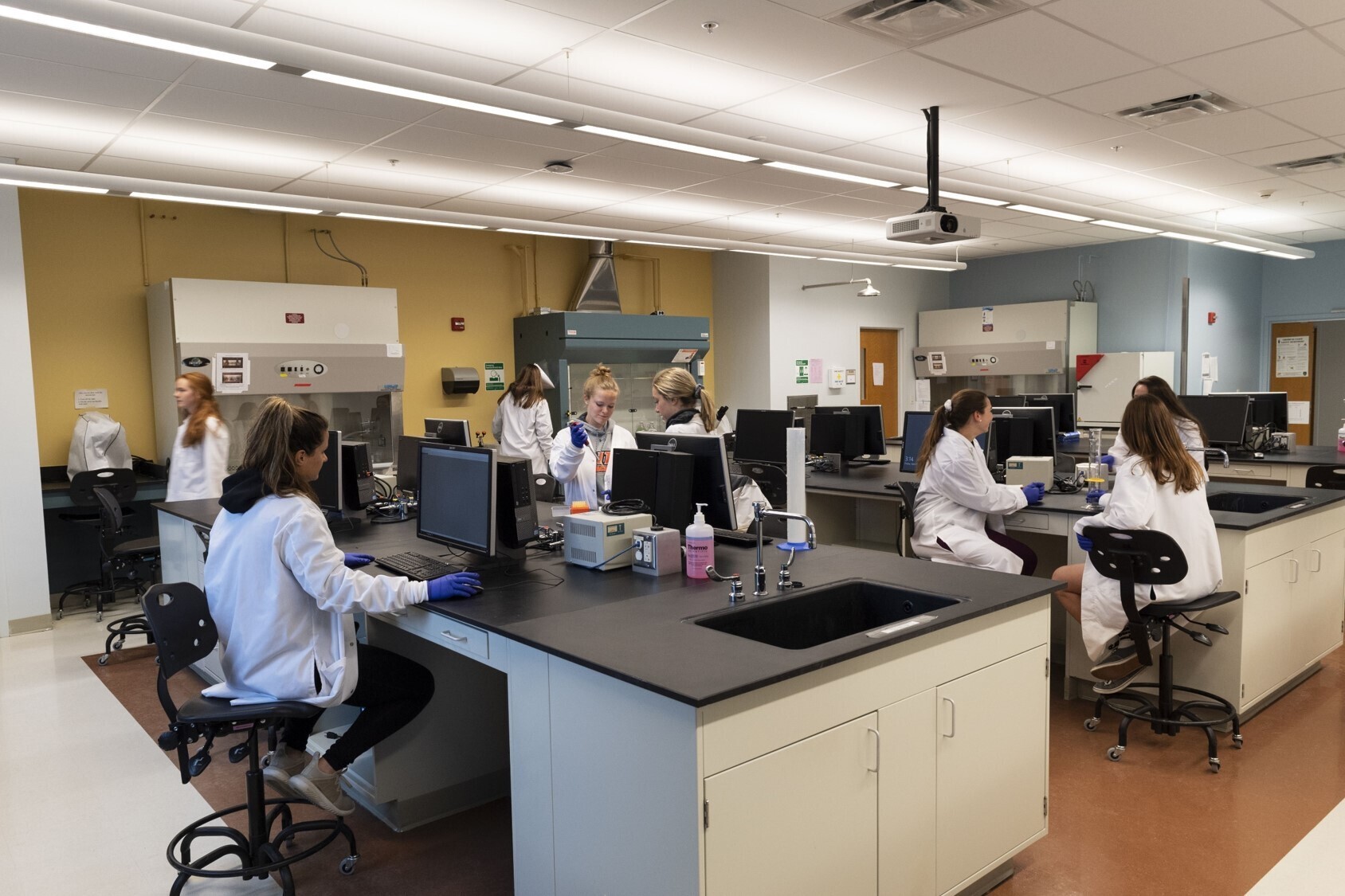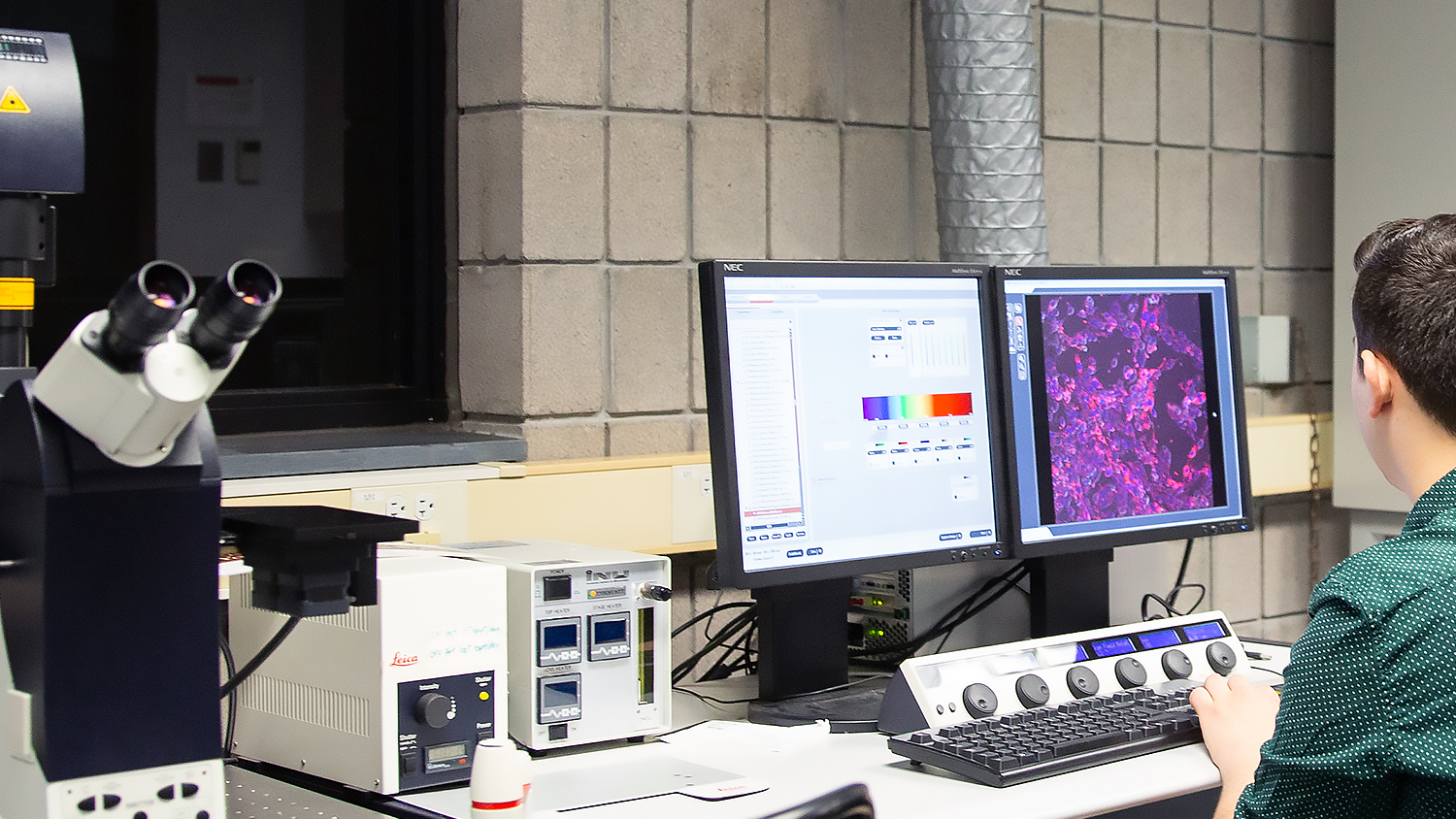Department of Biomedical Engineering

Department of
Biomedical Engineering
- RIT/
- College of Engineering/
- Academics/
- Departments/
- Biomedical Engineering
Contact
Jennifer Bailey, Undergraduate Program Director
585-475-4964, jlbbme@rit.edu
Overview
Biocompatibility testing, engineering artificial organs and tissues, developing new drug delivery systems, creating or modifying innovative medical devices, enhancing medical imaging techniques, or designing procedures to meet regulatory requirements are just a few examples of the work performed by a biomedical engineer to improve the health and well-being of others. Biomedical engineers combine their knowledge of engineering with biology, anatomy, and physiology to create devices and systems for a variety of healthcare issues. The need for sophisticated diagnostic and therapeutic equipment and solutions has fueled the demand for biomedical engineers who commonly work in multidisciplinary teams to develop devices, equipment, and procedures for a number of medical applications. The multidisciplinary nature of biomedical engineering requires professionals to develop an expertise in both engineering and biological sciences.
Biomedical engineering applies the principles and theories of engineering to solve problems in the wide-ranging field of medicine. Biomedical engineers can be found working alongside scientists, other engineering professionals, and medical practitioners to evaluate the complex, interdependent systems of the human body to develop effective solutions to enhance the quality of life for all patients. Biomedical engineers play a key role in developing and defining the engineering requirements and specifications necessary to actually bring these devices and protocols to fruition. It is a rapidly growing field with a variety of career opportunities for students with an interest in combining engineering with medicine.
Biomedical engineers are first and foremost engineers. Biomedical engineering is the branch of engineering that uniquely leverages the vast knowledge base of biology and medicine to solve problems focused on health care and the human body. Biomedical engineers can be found working in a variety of settings depending on the type of work they do. Positions are available in academia, hospital laboratories, manufacturing settings as well as commercial offices. Biomedical engineers are employed to:
- Design systems and products, such as artificial internal organs, artificial devices that replace body parts, and machines for diagnosing medical problems
- Work with life scientists, chemists, and medical scientists to research the engineering aspects of biological systems of humans and animals
- Work with pharmaceutical companies to develop new drug therapies
- Evaluate the safety, efficiency, and effectiveness of biomedical equipment
Learn more about the biomedical engineering BS program at RIT
Mission Statement
To educate and train graduates who are technically competent and are prepared to apply knowledge in traditional and modern application domains. Additionally, they will possess a broad education and knowledge of contemporary issues that enable them to anticipate change and continually update their skills. They will also be able to communicate and work effectively with others in a professional and ethical manner to function as a biomedical engineer in a globally-connected society.
Vision
To prepare graduates to either enter directly into the work force as technically competent and sought-after professionals with reinforcement from experiential learning, or to prepare them with the fundamental knowledge to continue their education in graduate programs.
Values
Student Centered: Our department makes decisions and behaves in a manner that demonstrates the primary importance of the students’ needs and interests.
Community: The department is a close-knit community characterized by respect for its differences, inclusion of a diverse set of ideas and people, and friendly collaboration among the faculty, staff, and students.
Teaching Excellence: To demonstrate continuous excellence and innovation in how we deliver classes to our students, and the support we provide our students outside of class.
Experiential Learning: To provide experiential learning throughout the undergraduate curricula via cooperative education, relevant projects, and practical experiences in state-of-the-art labs.
Research: Faculty members will conduct studies that encompass a vast spectrum of the biomedical field, allowing students to engage in innovative research opportunities.
Accreditation
The BS degree in biomedical engineering is accredited by the Engineering Accreditation Commission of ABET, www.abet.org. For enrollment and graduation data, program educational objectives, and student outcomes, please visit the college’s accreditation page.
Industrial Advisory Board
To help ensure that industry needs are satisfied through the proper training and education of biomedical engineering students, an annual meeting is held with the members of the industrial advisory board. The board is comprised of professionals from all areas of biomedical engineering, and also includes some RIT alumni as well.
52/48
Ratio of Men to Women
98%
Outcomes Rate
290
companies have hired biomedical engineering co-op students
Undergraduate Degrees
With RIT’s biomedical engineering BS, you’ll combine engineering with biology and medicine to create innovative solutions that improve human health.
Learn more about the Biomedical Engineering BS programGraduate Degrees
The biomedical and chemical engineering Ph.D. program provides you with the knowledge, training, and expertise to tackle important problems in diverse industries.
Learn more about the Biomedical and Chemical Engineering Ph.D. programRIT’s biomedical engineering MS produces professionals who can innovate solutions for today’s most pressing health care challenges.
Learn more about the Biomedical Engineering MS programIn RIT's microsystems engineering Ph.D., you’ll conduct research in nano-engineering, design methods, and technologies for micro- and nano-scaled systems.
Learn more about the Microsystems Engineering Ph.D. programResearch
We analyze and design blood contacting medical devices and study the science and engineering methods used to minimize cell damage.
We develop medical imaging techniques to study the mechanical nature of a variety of human pathologies.
Intelligent Interaction Research (I2R)
We develop interactive technologies to help people with cognitive disabilities and mental disorders.
We use microengineering techniques to design 3D extracellular matrix (ECM) environments to study cell and tissue-scale phenomena.
We develop rapid microfluidic-based techniques to offer an alternative to traditional bench scale separation & purification processes.
We design and use nanomaterials to solve biomedical problems at the cellular and molecular level.
Tissue Regeneration & Mechanobiology
We use cells, biomaterials, genome engineering, biologics and mechanical cues to promote tissue regeneration.
Latest News
-
February 24, 2025

Researchers explore how mechanical signals influence viral infections in lungs
The process combines virology and mechanobiology, two distinct areas of study that had not been explored at the same time but might prove to be a way to better understand disease progressions to intervene earlier and improve patient outcomes.
-
December 2, 2024

Tiny laboratories that fit in your hand can rapidly identify pathogens using electricity
An essay by Blanca Lapizco-Encinas, professor in the Department of Biomedical Engineering, published by The Conversation.
-
October 18, 2024

New micro-technique to differentiate pathogens faster discovered by RIT researcher
RIT researcher Blanca Lapizco-Encinas found new ways to identify those mutations faster. Resurrecting an older theoretical technique that can be used for analyzing pathogens that cause disease, her work could improve how clinicians develop more effective treatments.
Featured Work and Profiles
-
New Micro-Technique Could Revolutionize Pathogen Detection at RIT
RIT researcher Blanca Lapizco-Encinas has developed a new micro-technique using non-linear electrophoresis to rapidly identify and analyze pathogens for faster, more effective treatment decisions.
Read More about New Micro-Technique Could Revolutionize Pathogen Detection at RIT -
RIT Researchers Develop Data-Driven Platform for Better Cardiac Ablation
RIT researchers, led by Professor Cristian Linte, are developing a computational platform to better monitor and visualize cardiac tissue response to thermal ablation therapy, aimed at improving...
Read More about RIT Researchers Develop Data-Driven Platform for Better Cardiac Ablation -
What's Being Made in the SHED
Making at RIT has hit a new level now that several makerspaces in the Student Hall for Exploration and Development (SHED) have opened. Learn what's being created.
Read More about What's Being Made in the SHED -
RIT Researcher Discovers New Micro-Technique That Differentiate Pathogens Faster
Pathogens like E. coli and SARS-Cov2 mutate and are often resistant to current vaccinations. RIT researcher Blanca Lapizco-Encinas found new ways to identify those mutations faster.
Read More about RIT Researcher Discovers New Micro-Technique That Differentiate Pathogens Faster -
RIT Researchers Develop Next-Gen Tools to Boost Precision in Cardiac Ablation Therapy
With NSF funding, biomedical engineering researchers are developing non-invasive tech that better assesses cardiac tissue response to thermal energy, a common therapy for both cancer and cardiac...
Read More about RIT Researchers Develop Next-Gen Tools to Boost Precision in Cardiac Ablation Therapy -
Researchers Unveil New Method to Track Cancer Cell Movement
Vinay Abhyankar Vinay Abhyankar, assistant professor of biomedical engineering, and doctoral students Mehran Mansouri and Indranil Joshi have developed a groundbreaking method to study how cancer cells follow...
Read More about Researchers Unveil New Method to Track Cancer Cell Movement
Student Organizations
The mission of the RIT BioPrint club is to provide an interdisciplinary environment geared toward bringing together students from different fields of interest and expertise with the overall goal of learning from one another in a real world, hands-on application environment.
The Biomedical Engineering Society is the professional society for biomedical engineering and bioengineering. Founded in early 1968, the society now boasts more than 7,000 members and is growing rapidly.
Engineering World Health inspires, educates, and empowers young engineers, scientists, and medical professionals from more developed parts of the world to use their engineering skills to improve global health.
Student Resources
The Biomedical Engineering Department offers a variety of resources for our students that vary from academic support to handbooks and more. Visit our Student Resources page for more information.

































